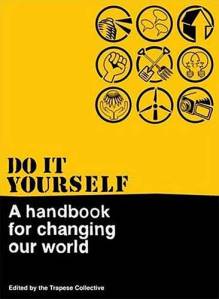Please join us on Sunday September 30 when we discuss Trapese Collective’s Do it Yourself: A Handbook For Changing Our World.
The book explores how we can build radical and meaningful social change, ourselves, here and now, resisting the world we live in while creating the world we want to see and making governments and corporations increasingly irrelevant. It weaves together analysis, stories and experiences, combining in-depth analytical chapters followed by “How to Guides” with practical ideas for organising [sic] collectively for change.
* Note – This book is published under a creative commons license so it’s not “stealing” when you download it from here: http://trapese.clearerchannel.org/resources.php
Hard copies are available at Bluestockings
 What: Reading and discussion of Do It Yourself: A Handbook for Changing the World
What: Reading and discussion of Do It Yourself: A Handbook for Changing the World
When: September 30, 2:30pm
Where: Bluestockings, 172 Allen St; http://www.bluestockings.com/events/
** Have suggestions for future readings? Let us know here: https://practicalanarchynyc.wordpress.com/books-you-would-like-to-read/


During the discussion of Do It Yourself: A Handbook for Changing the World, (September), there were questions regarding the discussion on p53 about consensus decision making practices among the Muscogee (Creek). Without going into detail, some expressed the desire to have more information about it. I did what digging I had time for and located one source that points to several others to support the assertion in DIY – I’ve typed it out and pasted below. Many of the sources cited in the article (fn 4) can be read on google books. If people have more sources and information to add about non-coercive decision making practices among indigenous people of the americas please share!
From Morris, Glen, For the Next Seven Generations: Indigenous Americans and Communalism (1996) http://www.ic.org/pnp/cdir/1995/30morris.php
“Communal Harmony among the Muscogee
A second example of advanced indigenous social organization is the Muscogee (Creek) Nation. Originally located in Alabama and Georgia, the Muscogee have the oldest political institutions in North America, with a continuing, recorded history going back beyond 400 years. The decentralized, matriarchal, communal nature of the Muscogee permeates every aspect of life, from familial relationships to the administration of criminal justice. Muscogee society provides balance and harmony, while fostering a large degree of personal autonomy and freedom.
As Sharon O’Brien describes,
Harmony was so highly valued among the Muscogees that a special system was devised to maintain it even when a major issue could not be settled to everyone’s satisfaction. If a member or several members of a talwa [Muscogee town] continued to disagree with the majority on a policy, they were free to move and establish their own community, with the support — not the enmity — of those whose talwa they were leaving. When a dissident group established a new town — and also when a neighboring tribe joined the Muscogee Confederacy, an ember from one of the mother talwas was used to start the fire of the new settlement as a symbol of continuity and unity. 4
The Muscogee exhibit some essential characteristics of the communalism found in many indigenous societies:
the importance of spirituality and respect for all life;
the absence of hierarchical, coercive authority with the goal of consensus in decision making;
the liberty of the individual coupled with the individual’s consciousness of responsibility to the whole;
the importance of extended family with concomitant respect for both the children and the elders; and
the operation of systems of justice that focus on the healing of society and the restoration of balance, rather than retribution or vengeance.”
4. O’Brien, Sharon, American Indian Tribal Governments (Norman: University of Oklahoma Press, 1989), 23. Debo, Angie, The Road to Disappearance: A History of the Creek Indians (Norman: University of Oklahoma Press, 1941), describes Muscogee (Creek) sociopolitical systems and United States subversion, as do the following titles. Green, Donald E., The Politics of Indian Removal: Creek Government and Society in Crisis (Lincoln: University of Nebraska Press, 1977). Moore, John H. “The Muskoke National Question in Oklahoma,” Science and Society 52(2) (1988): 163.